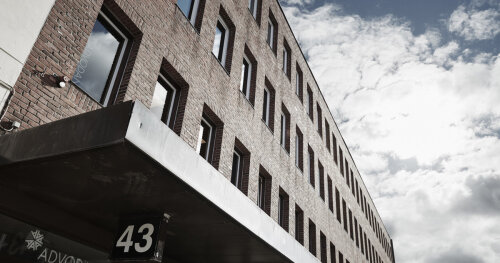Best Commercial Litigation Lawyers in Roskilde
Share your needs with us, get contacted by law firms.
Free. Takes 2 min.
List of the best lawyers in Roskilde, Denmark
About Commercial Litigation Law in Roskilde, Denmark
Commercial litigation in Roskilde, Denmark, involves the legal processes and court proceedings that resolve disputes arising from business and commercial activities. This practice area covers conflicts between businesses, such as contract disagreements, partnership or shareholder issues, debt recovery, breach of duty cases, and disputes concerning trade, intellectual property, and more. Roskilde, like the rest of Denmark, operates under a legal framework grounded in Danish law, ensuring that commercial entities adhere to fair and lawful conduct. Courts in Denmark handle these disputes with a structured approach, whether through negotiation, mediation, arbitration, or litigation in court.
Why You May Need a Lawyer
People and organizations may require legal help with commercial litigation for several reasons. Common situations include disputes over business contracts, disagreements between business partners or shareholders, claims of breach of contract or duty, conflicts related to mergers and acquisitions, or defense against claims from other business entities. There may also be cases involving allegations of fraud, issues with intellectual property, or disputes about real estate or employment contracts in a commercial setting. A qualified lawyer helps to interpret the applicable laws, represent interests in negotiations or court, gather and present evidence, ensure procedural compliance, and, ultimately, protect your business or personal assets and reputation during a dispute.
Local Laws Overview
Commercial litigation in Roskilde is governed by Danish law, including the Danish Contracts Act, the Danish Sale of Goods Act, the Administration of Justice Act, and several specific commercial statutes. Key aspects that are especially relevant locally include the strong emphasis on written contracts, the principle of freedom of contract (meaning parties decide most terms unless prohibited by law), and the Danish courts’ preference for resolving disputes amicably before full-scale litigation. Arbitration and mediation are often used alternatives to court cases, especially for more complex commercial matters. Proceedings in the courts of Roskilde follow national civil procedure, with a focus on ensuring fair processes and timely resolution. Strict rules regarding evidence, limitation periods, and the need for clear documentation play a significant role in commercial disputes.
Frequently Asked Questions
What is commercial litigation?
Commercial litigation refers to the legal process that resolves disputes arising from business and commercial relationships, such as conflicts over contracts, business operations, and other company-related issues.
Do I need to go to court to resolve a commercial dispute?
Not always. Many commercial disputes are resolved through negotiation, mediation, or arbitration. Legal assistance can help determine the best course of action for your specific case.
What kinds of cases do commercial litigation lawyers handle?
These lawyers handle cases such as contract disputes, partnership disagreements, debt recovery, breach of contract, business torts, and issues related to intellectual property or unfair competition.
Can a foreign company be involved in commercial litigation in Roskilde?
Yes, foreign companies conducting business in Roskilde or Denmark can be involved in local commercial litigation, subject to Danish laws and, sometimes, international agreements.
What is the typical process for a commercial litigation case in Roskilde?
Generally, the process involves filing a claim, exchanging written submissions, presenting evidence, possible attempts at settlement or mediation, court hearings, and finally, a judgment.
How long does commercial litigation usually take?
The duration depends on the complexity of the case and whether the dispute is settled early or proceeds through a full trial. Cases can take months or, in complex matters, longer. Early settlements or mediation may shorten the process.
What costs are involved in commercial litigation?
Costs can include court fees, legal representation fees, expert fees, and potentially costs awarded to the winning party. Some cases allow for compensation of legal costs, partially or fully, by the losing party.
Is mediation or arbitration available for commercial disputes?
Yes, both mediation and arbitration are encouraged in Denmark and are effective alternatives to court litigation, often resulting in faster and more confidential resolutions.
What evidence is needed for a commercial litigation case?
Typical evidence includes written contracts, business correspondence, invoices, records, witness statements, and expert opinions relevant to the dispute.
How can I protect my business interests during a dispute?
Engage a qualified lawyer early, maintain clear records and documentation, follow legal procedures, and consider settlement options to protect your business’s financial and reputational interests.
Additional Resources
- The Danish Courts (Domstolene) for information on court procedures and locations - Danish Bar and Law Society (Advokatsamfundet) to find qualified lawyers - The Danish Business Authority (Erhvervsstyrelsen) for business-related legal information - The Danish Chamber of Commerce (Dansk Erhverv) for support in commercial matters - Mediation Institutes or Arbitration Boards that offer alternative dispute resolution services
Next Steps
If you find yourself facing a commercial dispute or need legal guidance related to commercial matters in Roskilde, Denmark, your next steps should include gathering all relevant contracts and documents, identifying the core issues and parties involved, and consulting with a lawyer experienced in Danish commercial litigation. Early legal advice can prevent escalation and improve your chances of a favorable outcome. Reach out to local legal professionals, utilize recommended resources, and do not hesitate to ask for guidance on mediation or arbitration options as alternatives to court proceedings.
Lawzana helps you find the best lawyers and law firms in Roskilde through a curated and pre-screened list of qualified legal professionals. Our platform offers rankings and detailed profiles of attorneys and law firms, allowing you to compare based on practice areas, including Commercial Litigation, experience, and client feedback.
Each profile includes a description of the firm's areas of practice, client reviews, team members and partners, year of establishment, spoken languages, office locations, contact information, social media presence, and any published articles or resources. Most firms on our platform speak English and are experienced in both local and international legal matters.
Get a quote from top-rated law firms in Roskilde, Denmark — quickly, securely, and without unnecessary hassle.
Disclaimer:
The information provided on this page is for general informational purposes only and does not constitute legal advice. While we strive to ensure the accuracy and relevance of the content, legal information may change over time, and interpretations of the law can vary. You should always consult with a qualified legal professional for advice specific to your situation.
We disclaim all liability for actions taken or not taken based on the content of this page. If you believe any information is incorrect or outdated, please contact us, and we will review and update it where appropriate.











